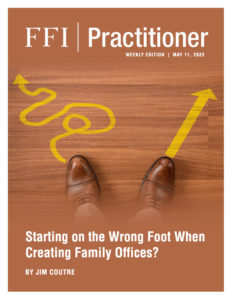
View this edition in our enhanced digital edition format with supporting visual insight and information.
According to this week’s contributor, Jim Coutre of Fidelity Family Office Services, in order to create better family offices, practitioners must be honest about what (or who) may be holding the family office back from delivering the highest value to their clients. In his article, Jim shares his observations about how family office designs may be getting off on the wrong foot.
Genuinely, how many families are excited about their family office? How many families believe their office makes them richer in ways beyond growing financial wealth? How many families view their office as a lever for change for their family and the world around them? How many families have an office that can even survive one generational transition?
Too few.
That doesn’t make single family offices wrong or broken, but it does illuminate a lost opportunity and can drive us, as professionals entrusted by enterprising families, to imagine a new generation of family offices rather than continue to mint replicas of the same underperforming models.
Where to start? Let’s go back to the beginning and take a critical look at their origins. And let’s take that look through a lens that assumes they are flawed from the start, so that we are forced to confront constraints and biases and, ideally, feel compelled to innovate.
Single family offices commonly originate from and are shaped by several realities:
1. Family offices are built around need rather than opportunity or vision:
- Tangible needs, such as investment or tax management, are typically the pain points that drive a family to create an office.
- Many families encounter tangible needs long before they recognize their intangible needs, such as defining shared family goals or the purpose of their wealth.
- Families tend to focus and make progress on the things for which they are held accountable. Tax returns need to be filed, but finding joy doesn’t have a due date.
2. Family office startups lack diverse input and find safety in replicating the norm:
- Professionals who have never started an office gather insight from peers who look, sound, and think like they do.
- Professionals without experience in starting an office typically come from a risk-averse professional field and will understandably want to stay within the standard deviation of the peer offices they have talked with.
- Professionals with previous experience in starting family offices will naturally use the same process and thinking they have used before—and which they sold to the family to get the job.
3. Family offices equipped only with hammers tend to treat everything as if it were a nail:
- Professionals naturally lean on their expertise, viewing priorities and decision-making through the lens of what they know best and what they assume the family wants, as they were hired for their expertise.
- Families, not being experts in family offices, naturally defer direction of the office to the professionals they hire.
- Families mostly hire technical professionals and rarely hire professionals with deep understanding of family systems or who are dedicated to family thriving. Thus, the maintenance of financial wealth dominates the discourse and culture.
4. Family office startups can be shaped by unproductive or unhealthy narratives:
- Family offices are built around a conflicted relationship with financial capital; it is seen both as the priority to protect AND as the thing that family members must be protected from.
- Family offices are most often approached as a cost center rather than as an investment in a family or an individual.
- Family offices are structured around generational hierarchy, in which the few at the top make decisions for the many at the bottom.
- The ghost of Carnegie still looms large: the plan to make money at any cost and then give it away remains prominent.
5. Professionals are not family members:
- Families often relinquish the deep thinking around what the family wants or what is best for the family to professionals who don’t know them.
- Professionals who create offices to serve multiple family members rarely know those family members and don’t know if it is healthy for the family members to stay connected through an office.
- Professionals tend to start building in “doer mode” rather than “strategic-thinker mode.”
- Professionals are held accountable for specific, measurable metrics and will focus on them, even at the expense of more important, less measurable outcomes.
6. Family members are not professionals:
- Very few family members come to the table with familiarity of diverse family office models and possibilities.
- Family members starting offices often consult peer families for guidance, which creates a small, idiosyncratic data set of what offices are or can be.
- Decisions around keeping family members connected are rarely co-created by those family members.
Viewing single family offices as flawed from the start obviously steps over all of the positive and powerful ways that they serve their families. However, an effective practitioner’s job is to be self-reflective, inquisitive, and innovative in support of the families who hire him or her—and, some might go as far to suggest, in support of the society they impact. To that end, there is no prescriptive way to use these ideas. Those practitioners who are in the process of starting a family office might consider reviewing these thoughts with the involved parties to spur broader or more diverse thinking. Those professionals who manage a family office might benefit from giving themselves time to absorb these thoughts and see if any “aha moments” emerge. Regardless, challenging the current state of family offices while being hyper-aware of how professionals impact their form and function may be the starting point for discovering the family office of the future.
This article was informed by the thinking of The Future of the Single Family Office Think Tank. Members include Stacy Allred, Jill Barber, Lisa Bennett, Paul Carbone, James Coutre, Mary Duke, Joni Fedders, Andrew Keyt, Greg McCann, Scott Peppet, and Jill Shipley.
About the Contributor

Jim Coutre, ACFWA/ACFBA, is vice president of Insights and Connections at Fidelity Family Office Services in Boston. Jim is a member of the GEN faculty and will be co-leading GEN 504 Philanthropy, Investing and the Family Enterprise: An Advisor’s Role in Supporting the Family’s Pursuit of Impact in September 2022. He can be reached at James.Coutre@fmr.com.

View this edition in our enhanced digital edition format with supporting visual insight and information.





